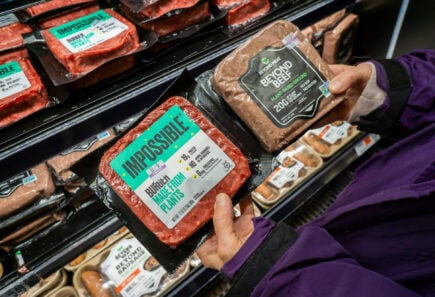
ESG measurement and reporting
The Good Food Institute & FAIRR co-developed ESG frameworks to supply investors and companies involved in the alternative proteins industry with powerful, standardized tools to monitor, measure, and report industry-specific risks and opportunities.
Access the ESG framework
Download the frameworks and technical guides.
Introduction
The GFI & FAIRR Alternative Proteins ESG Reporting Frameworks have been developed in response to growing investor interest in alternative proteins and investors’ desire to measure and analyze ESG characteristics of alternative protein companies and business lines. Until now, such measurement and analysis has been hindered by a lack of industry-specific measurement and reporting guidelines. The ESG frameworks we co-developed address this gap by serving as industry-specific tools public and private companies may use to report on the performance of their alternative protein businesses. Investors can use the frameworks to conduct due diligence on companies involved in alternative proteins and gain transparency into the related characteristics of such companies. The frameworks also serve as roadmaps for ESG best practices within the industry.
What is ESG?
Environmental, social, and governance (ESG) criteria are a set of standards for a company’s behavior used by impact-conscious investors to screen potential investments. Environmental criteria consider how a company safeguards the environment, including corporate policies addressing climate change, for example. Social criteria examine how it manages relationships with employees, suppliers, customers, and the communities where it operates. Governance deals with a company’s leadership, executive pay, audits, internal controls, and shareholder rights. (source: Investopedia)
About the frameworks
There are two frameworks, the Alternative Proteins ESG Reporting Framework for Specialized Companies (the “Specialized Framework”) and the Alternative Proteins ESG Reporting Framework for Diversified Companies (the “Diversified Framework”).
- The Specialized Framework is designed for manufacturers and ingredient suppliers of any size whose core focus is alternative proteins.
- The Diversified Framework is designed for companies that produce a variety of products and are diversifying their product portfolios to include alternative proteins. This includes food retailers, manufacturers, and animal protein producers.
Download the frameworks
Each framework is available in a user-friendly Excel format that may be used directly for reporting purposes. Each framework is accompanied by a technical guide, which provides additional information on the framework’s scope, objectives, development, and design, as well as how it may be used effectively by investors and companies.


Do you have feedback or a case study to share?
We’d love to hear if you have any feedback on how we can improve the frameworks and technical guides or learn about how you are using them. We’ll use the information you provide to make corrections, inform framework updates for future releases, and create case studies that will help enable us to encourage further adoption.
Frequently asked questions
Selecting a framework
How does my company decide which framework to report to?
There are two frameworks: the Alternative Proteins ESG Reporting Framework for Specialized Companies (the “Specialized Framework”) and the Alternative Proteins ESG Reporting Framework for Diversified Companies (the “Diversified Framework”). The Specialized Framework is designed for manufacturers and ingredient suppliers of any size whose core focus is producing alternative proteins. Meanwhile, the Diversified Framework is designed for companies that produce a variety of products and are diversifying their product portfolios to include alternative proteins. This includes food retailers, manufacturers, animal protein producers, and others who have growing exposure to alternative proteins.
For further details see the “Scope” sections of the respective technical guide.
Considerations for specialized companies
Is it appropriate for companies that do not have any commercially available alternative protein product to report to the Specialized Framework?
In some cases, this may be appropriate, but it would be unusual. Companies most likely to report to the Specialized Framework without a commercially available product are those developing novel products like cultivated meat that do not yet have regulatory approval in their region of operation. Such companies may have scaled their manufacturing process to a pilot or demo stage to prepare for production upon receiving regulatory approval, and therefore would fit the criteria for reporting to the framework, per the below.
Guidance for reporting to the framework is based upon the manufacturing stage of a company. Lab stage companies are not asked to report to the framework, though companies may do so if they like and can still use the framework to guide the development of their ESG policies, procedures, and reporting. A lab stage company is defined as an early-stage company whose products or ingredients/inputs are still in the research and development phase and who has no commercially available product. Company resources are focused on idea validation, including product or ingredient development, and business planning. Development and any small-scale manufacturing are taking place at a lab facility and can be on the order of grams to kilograms or 10s of liters.
Both pilot/demo stage and commercial stage companies are asked to report to the framework, though with differing guidance.
Pilot and demo stage companies are asked to complete questions marked ‘All stages’ within two years of the publication of this framework (September 2024), or within two years of graduating to the pilot or demo manufacturing stage. A pilot or demo stage company is defined as a company that has developed a product or ingredient/input that is being publicly tested, has recently been released to the market, or is being distributed as a B2B ingredient/input. The company may have recently entered the market and while the company may be experiencing rapid growth, it may not yet be profitable. Manufacturing is taking place at a contract manufacturer and/or a small-scale, pre-commercial facility with a production volume of 100s of tons or liters.
Commercial stage companies are asked to complete questions marked ‘All stages’ and ‘Commercial’ within two years of the publication of this framework (September 2024) or within two years of graduating to the commercial manufacturing stage. A commercial stage company is defined as a company that is more established in its industry, with a known product and customer or B2B following, and/or is likely profitable with sustainable growth. Companies will have completed or will be in the process of consumer testing, nutritional profiling, validating preparation methods, and shelf stability testing. Companies will be focused on end product refinement or expanding their product offerings. Manufacturing is taking place at scale at a contract manufacturer and/or a large-scale, commercial facility on the order of 1000s of tons or liters.
For further details see the “Manufacturing stages and definitions” section of the Specialized Framework technical guide.
Is there an age or funding minimum under which start-ups should not report to the Specialized Company Framework?
There is no age or funding minimum for a company. Guidance for reporting to the framework is based upon the manufacturing stage of a company. Lab stage companies are not asked to report to the framework, though companies may do so if they like and can still use the framework to guide the development of their ESG policies, procedures, and reporting.
A lab stage company is defined as an early-stage company whose products or ingredients/inputs are still in the research and design phase and who has no commercially available product. Company resources are focused on idea validation, including product or ingredient development, and business planning. Development and any small-scale manufacturing are taking place at a lab facility and can be on the order of grams to kilograms or 10s of liters.
For further details see the “Comparability Assessment” section of the Specialized Framework technical guide.
Considerations for diversified companies
Is there a minimum alternative-protein-related revenue level under which producers, manufacturers, or retailers should not report to the Diversified Company Framework?
No matter the amount of revenue related to alternative proteins, all diversified companies can report to the framework (e.g., for some companies, alternative proteins may comprise <0.5% of total revenue, while for others it may be meaningfully higher). While we encourage companies to report to the framework at the business-segment level, we understand that this may not be possible for all companies at this time. Therefore, companies may report financial and business information, and associated ESG risks and opportunities, at the brand level instead.
Relationship with regulatory requirements
Are these disclosures required by any regulatory entity and/or are being incorporated into mandatory reporting frameworks such as the SEC’s drafted Climate-Related Disclosures?
No. While some disclosures in the GFI & FAIRR frameworks align to varying degrees with those included in the SEC’s drafted Climate-Related Disclosures and the drafted International Sustainability Standards (ISSB) standards (which may serve as a basis for future regulatory frameworks), no regulatory body is mandating reporting to these frameworks.
Publication of disclosures
If a company shares its disclosures with FAIRR or GFI, will the relevant organization publish them?
No. At this time, neither FAIRR nor GFI has plans to publish any full framework responses.
However, in 2023, FAIRR may reach out to diversified companies to ask them to pilot the Diversified Framework and collect company disclosures and feedback on the framework. Going forward, FAIRR may use the tool as part of its engagement methodology, and benchmark companies, or as part of its Consumer Protein Index.
Moreover, in 2023 or beyond, GFI may solicit companies to share framework responses to aid benchmarking, provide examples of strong disclosures, or for other purposes.
Both organizations encourage reporting companies to publish select responses on their own websites or integrate them into their annual reporting.
In particular, we recommend companies publish the following disclosures:
Diversified companies (from the Diversified Framework) E-C1, E-C6, E-C7, E-LCD2, E-LCD3, E-LCD4, E-W2, E-W4, E-W5, S-CE1, S-N1, and S-JT1
Pilot/demo-stage specialized companies (from the Specialized Framework) C4, C11, WM1, CE1, CE4, NP4 (plant-based only), W1, W2, W8, W10, NH1, and JT1
Commercial-stage specialized companies (from the Specialized Framework) C2, C8 (we recommend including a comparison to the appropriate animal protein), C11, LCD3 (we recommend including a comparison to the appropriate animal protein), WM3 (we recommend including a comparison to the appropriate animal protein), CE1, CE4, CE5, NP4 (plant-based only), W1, W2, W6, W8, W10, W11, W14, SC3, NH1, and JT1
Companies may share additional metrics at their discretion but are encouraged to seek legal advice if they have any questions or concerns. In particular, companies should note that sharing certain competitively sensitive information publicly or with market competitors may violate state or federal antitrust laws. Generally, information may be shared confidentially with investors.
Relationship to voluntary frameworks
Will reporting to either of the frameworks enable my company to claim compliance with any of the established voluntary reporting frameworks (e.g., TCFD, SASB, or CDP)?
Technically, no. However, for the Specialized Framework, there is a high degree of overlap (between 54 to 72%) with key voluntary reporting frameworks. Where such overlap occurs, it is noted on a disclosure-by-disclosure basis in each framework. For further details see the “Comparability assessment” section of the Specialized Framework technical guide.
For the Diversified Framework, while there is also overlap with voluntary reporting frameworks and the framework compliments companies’ existing voluntary disclosures, it does not enable a company to claim compliance with another voluntary reporting framework.
Definition of alternative proteins
My company defines alternative proteins differently to how the framework does. How should I report?
At this point in time, the Specialized framework only covers four types of alternative proteins: plant-based, fermentation-enabled, cultivated, and hybrid. The Diversified Framework also includes plant-based wholefood proteins and fats in its definition of alternative proteins.
If your company’s definition is outside the scope of these technologies, then this framework may not be applicable to you. If your definition falls inside the scope, then please provide your definition and define the scope of your reporting in the “Business Overview” tab of the framework and report as is applicable to your company.
Framework scoring mechanism
Is there a scoring mechanism built into the frameworks?
At this time, no. While a number of disclosure topics involve quantitative disclosures, their interpretation and assessment is up to the evaluating investors.
For more information see the respective technical guide.

Resource
Alternative proteins life cycle assessment guide
This best practice guide provides a standardized approach to undertaking LCAs for alternative protein manufacturers.
Invest in the entire industry with a donation to GFI
In addition to investing in individual startups, a donation to GFI will maximize your impact for the entire alternative protein industry. Being 100 percent powered by philanthropy allows us to keep resources and advisory services free and open-access.
GFI engages with all stakeholders across the value chain — from investors and startups to established manufacturers, retailers, and foodservice companies. This allows us to accelerate the entire alternative protein industry.

About these resources
These resources were developed by the Good Food Institute (GFI) and FAIRR, a Coller Initiative.
About GFI

Current meat production is unsustainable and The Good Food Institute (GFI) is a 501(c)(3) nonprofit working internationally to make alternative proteins delicious, affordable, and accessible. GFI advances open-access research, mobilizes resources and talent, and empowers partners across the food system to create a sustainable, secure, and just protein supply.
About FAIRR

Established by the Jeremy Coller Foundation, the FAIRR Initiative is a collaborative investor network that raises awareness of the environmental, social and governance (ESG) risks and opportunities brought about by intensive livestock production. With offices based in London, FAIRR provides cutting-edge research, best practice tools and collaborative engagement opportunities to help investors integrate these risks and opportunities into their investment decision-making and active stewardship processes.
Check out related resources

Cultivating a better future with impact investing
Alternative proteins can help investors achieve their ESG and corporate citizenship goals while driving positive outcomes for people and the planet.

Cultivated meat LCA/TEA report analysis
Recent studies show cultivated meat could have reduced environmental impacts and be cost-competitive with some forms of conventional meat.

Investor due diligence support
Considering investing in an alternative protein startup? Find support and resources here for conducting due diligence.

Alternative protein company database
Explore the landscape of plant-based, cultivated, and fermentation companies including consumer brands, manufacturers, and ingredients companies.
